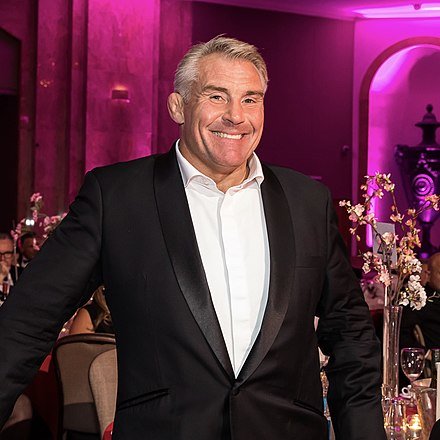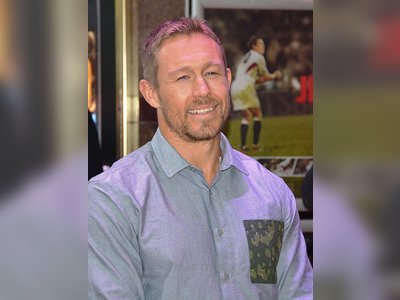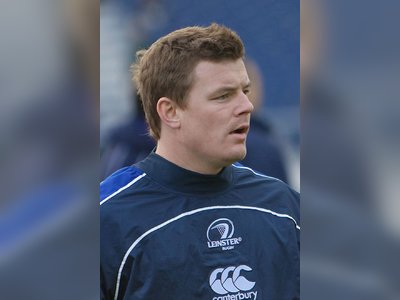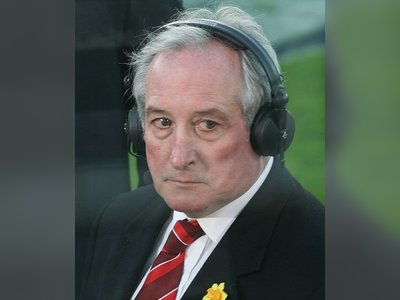British Heritage
Remember, Cherish, Learn.
beta
Jason Leonard

A Pillar of British Rugby Heritage.
Jason Leonard OBE (Order of the British Empire), born on 14 August 1968, stands as a testament to the power and impact of rugby in the United Kingdom. An English former rugby union player, he garnered immense respect and recognition through his contributions to the sport, specifically in his home country. This remarkable athlete accumulated a joint-record of 114 caps for the England men’s rugby team over his fourteen-year international career, an achievement that speaks to his consistency and resilience on the field. Leonard's indelible mark on British rugby and his continued work in sports governance significantly contribute to the robust and rich heritage of British sport.
Originally a prop, Leonard commenced his club rugby journey at Barking RFC, followed by stints at Saracens and Harlequins. His exploits on the field extended beyond the national level; he was a prominent part of the British & Irish Lions on three separate tours, securing five additional caps. The 1997 tour of South Africa remains a highlight, where the Lions emerged victorious in the test series.
On the national front, Leonard formed part of victorious England teams that claimed four Grand Slams (1991, 1992, 1995, and 2003). Notably, he also played an instrumental role in England’s success in the 2003 Rugby World Cup. His contributions to rugby were officially recognized in 2002 when he was awarded the MBE (Member of the Order of the British Empire), and again in 2003 when he received an OBE following England's World Cup triumph. Further testament to his skill and influence in the sport, Leonard was inducted into the World Rugby Hall of Fame in 2014.
Even after his retirement in 2004, Leonard continued his relationship with the sport. He held the Presidency of the RFU (Rugby Football Union) from 2015 to 2016 and is the current Chairman of the British & Irish Lions. His work in rugby governance underscores his dedication to the sport and ensures that he continues to shape its future in the UK.
In 2008, Leonard diversified his interests by joining the Besso Group, a recognized Lloyd's broker, in a senior advisory role. Notably, he also initiated his own special event service, the FunBus, extending his entrepreneurial spirit beyond the rugby field.
A native of Barking, Leonard started his rugby journey with his local club and school teams. His move to Saracens in 1989 marked the beginning of his professional career. Leonard's first international cap came on 28 July 1990, against Argentina. This marked the start of a series of achievements, as he quickly gained prominence in the largely dominant England pack.
Leonard's career was filled with defining moments and milestones. His versatility and durability were put to the test in 1992 when he suffered a severe neck injury but played through the rest of the match. Despite a grim prognosis, he made a full recovery and resumed his England test career later that same year.
Under the new coach Jack Rowell, Leonard's place in the England team was secured. During this period, he set a new record for a prop with his 38th cap for England in the 1995 Five Nations. Despite being rested in England's final pool match during the 1995 Rugby World Cup, Leonard returned to help his team clinch the quarter-final victory against Australia.
In 1996, Leonard captained England for the first time, scoring a try to level the scores against Argentina, leading to a narrow 20-18 victory. This was Leonard's only score for England, but it demonstrated his ability to step up in crucial moments.
As the new millennium began, Leonard broke multiple records, surpassing Rory Underwood as England's most capped player and then Sean Fitzpatrick as the world's most-capped forward. Leonard's career reached a crescendo when he became the first-ever front-row forward to make 100 international appearances in a Six Nations clash against France in 2003.
His international career culminated in the 2003 Rugby World Cup, where he helped secure England's victory. Leonard's final match for England was in the subsequent Six Nations Championship against Italy, after which he announced his retirement, leaving the sport as the most-capped forward of all time.
Beyond the field, Leonard has devoted himself to philanthropic efforts, demonstrating a commitment to using his fame and influence for the greater good. He has hosted Annual Dinners since 2004, raising over £2 million for charities and good causes. In 2014, he established The Atlas Foundation, an organization dedicated to helping underprivileged children worldwide through rugby communities and initiatives. Leonard’s philanthropic efforts have positively impacted over 50,000 children, further enhancing his legacy.
Leonard’s contribution to rugby has not gone unnoticed. In 2000, he was featured on "This Is Your Life," a popular biographical television show. His hometown honoured him in 2011 by naming a class 357 EMU train on the London, Tilbury and Southend line "Jason Leonard." Moreover, in 2012, Leonard received "The Prince Obolensky Award" for embodying the "Corinthian Spirit" in the game of Rugby Union.
Through his achievements on and off the field, Jason Leonard has become a central figure in British rugby heritage. His skill, resilience, and commitment to the sport and his community have left an indelible mark on the landscape of British sport. Through his continued work in rugby governance and philanthropy, Leonard’s legacy continues to shape the future of British rugby, making him a true testament to the spirit of the sport.
A Storied Career in Rugby
Originally a prop, Leonard commenced his club rugby journey at Barking RFC, followed by stints at Saracens and Harlequins. His exploits on the field extended beyond the national level; he was a prominent part of the British & Irish Lions on three separate tours, securing five additional caps. The 1997 tour of South Africa remains a highlight, where the Lions emerged victorious in the test series.
On the national front, Leonard formed part of victorious England teams that claimed four Grand Slams (1991, 1992, 1995, and 2003). Notably, he also played an instrumental role in England’s success in the 2003 Rugby World Cup. His contributions to rugby were officially recognized in 2002 when he was awarded the MBE (Member of the Order of the British Empire), and again in 2003 when he received an OBE following England's World Cup triumph. Further testament to his skill and influence in the sport, Leonard was inducted into the World Rugby Hall of Fame in 2014.
Transition from Player to Governance
Even after his retirement in 2004, Leonard continued his relationship with the sport. He held the Presidency of the RFU (Rugby Football Union) from 2015 to 2016 and is the current Chairman of the British & Irish Lions. His work in rugby governance underscores his dedication to the sport and ensures that he continues to shape its future in the UK.
In 2008, Leonard diversified his interests by joining the Besso Group, a recognized Lloyd's broker, in a senior advisory role. Notably, he also initiated his own special event service, the FunBus, extending his entrepreneurial spirit beyond the rugby field.
Defining Moments of an Illustrious Career
A native of Barking, Leonard started his rugby journey with his local club and school teams. His move to Saracens in 1989 marked the beginning of his professional career. Leonard's first international cap came on 28 July 1990, against Argentina. This marked the start of a series of achievements, as he quickly gained prominence in the largely dominant England pack.
Leonard's career was filled with defining moments and milestones. His versatility and durability were put to the test in 1992 when he suffered a severe neck injury but played through the rest of the match. Despite a grim prognosis, he made a full recovery and resumed his England test career later that same year.
Under the new coach Jack Rowell, Leonard's place in the England team was secured. During this period, he set a new record for a prop with his 38th cap for England in the 1995 Five Nations. Despite being rested in England's final pool match during the 1995 Rugby World Cup, Leonard returned to help his team clinch the quarter-final victory against Australia.
In 1996, Leonard captained England for the first time, scoring a try to level the scores against Argentina, leading to a narrow 20-18 victory. This was Leonard's only score for England, but it demonstrated his ability to step up in crucial moments.
As the new millennium began, Leonard broke multiple records, surpassing Rory Underwood as England's most capped player and then Sean Fitzpatrick as the world's most-capped forward. Leonard's career reached a crescendo when he became the first-ever front-row forward to make 100 international appearances in a Six Nations clash against France in 2003.
His international career culminated in the 2003 Rugby World Cup, where he helped secure England's victory. Leonard's final match for England was in the subsequent Six Nations Championship against Italy, after which he announced his retirement, leaving the sport as the most-capped forward of all time.
Charitable Pursuits
Beyond the field, Leonard has devoted himself to philanthropic efforts, demonstrating a commitment to using his fame and influence for the greater good. He has hosted Annual Dinners since 2004, raising over £2 million for charities and good causes. In 2014, he established The Atlas Foundation, an organization dedicated to helping underprivileged children worldwide through rugby communities and initiatives. Leonard’s philanthropic efforts have positively impacted over 50,000 children, further enhancing his legacy.
Honours and Recognition
Leonard’s contribution to rugby has not gone unnoticed. In 2000, he was featured on "This Is Your Life," a popular biographical television show. His hometown honoured him in 2011 by naming a class 357 EMU train on the London, Tilbury and Southend line "Jason Leonard." Moreover, in 2012, Leonard received "The Prince Obolensky Award" for embodying the "Corinthian Spirit" in the game of Rugby Union.
Through his achievements on and off the field, Jason Leonard has become a central figure in British rugby heritage. His skill, resilience, and commitment to the sport and his community have left an indelible mark on the landscape of British sport. Through his continued work in rugby governance and philanthropy, Leonard’s legacy continues to shape the future of British rugby, making him a true testament to the spirit of the sport.
- Jason Leonarden.wikipedia.org



